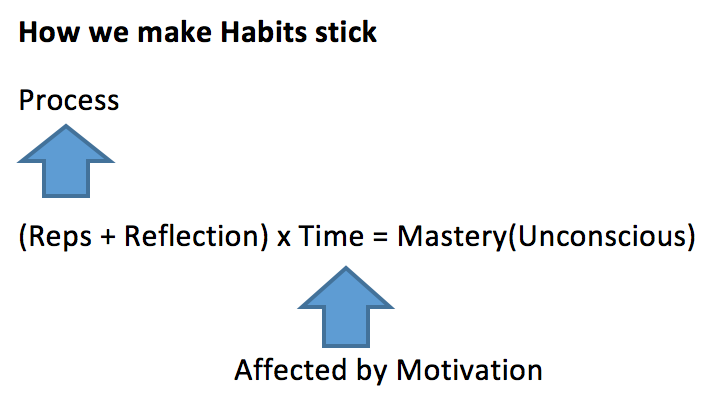
Last month I attended a seminar with one of the world’s leading behavioural change specialist Coach Stevo who runs an amazing program called the habitry. His program has helped 100’s of people make positive changes in their lives, but more importantly he has created a community where everyone helps one another stay on track with these changes. So over the next few weeks and months I will be introducing the principals of this program with our clients, but I wanted to share the jist of the program with you today.
So first of what is a habit and why are they important? Habits are really important as most people know what they need to do to get fit and healthy but they just don’t have the habits to see it through. But we know that losing weight, improving movement quality, and changing behaviour is a set of skills that have to be learned and continuously practiced. Often it is a case of what to do next that people struggle with and this where creating habits to support it can have an important role to play.
Put simply, habits are the built-in tendency for our brains to repeat the stuff they’ve done before They’re are a type of brain function that we identify by 4 tell-tale features, the most obvious being frequency. Most people understand habits as actions that you perform a whole lot. Things you do every day like brushing your teeth, making coffee in the morning, crossing the road at the same place every day on your walk. Researchers have also identified a number of other features that define habits.
4 Features of a Habit
- Frequent. It takes time for things to become habit and they have to be performed in a consistent context for the loop to get engrained.
- Automatic. Habits are the stuff we do almost entirely on autopilot. They take little to no effort. In fact, they often crop up when we are exerting effort on other things.
- Triggered. This means that something in our environment flicks the domino and all the actions necessary for a habit just start falling into place.
- Subconscious. Habits take place almost entirely below our level of awareness. Both the triggering and the action.
Rules Off the Get Result’s Habits Program
- They have to be 100% under your control. You cannot rely on anyone else. For example, if your habit was to eat a healthy dinner but your partner made dinner for you that would not be a good habit statement. Or saying “I will sleep 8 hours per night”, many people struggle to get to sleep or wake through the night. Therefor the habit is not within their control. A better habit statement would be. I will create a quality sleeping routine.
- You must write the habit statement (or type it)
- You must personalise the statement for yourself. And you must choose a trigger that is appropriate for you.
- Ask yourself every day what did I do well today and what did I learn today?

Reps: Is doing the habit over an over until it become unconscious. We do it on a two-week loop in our program to give you time to get the reps in
Reflection: Ask yourself every day what did I do well today and what did I learn today?
Time: It is important you know why you are doing it and make sure it is something that ties in with who you want to be. If not you will not complete the reps over long enough of a time to make it a habit.
Writing a Habit Statement
In our program we will get you to write a habit statement in whichever key value that we are focusing on for that fortnight. (the first six values we have selected are: walking daily, plan a sleeping routine, eat vegetables, plan your dinners, have a relaxation plan, keep a food journal). This has to be something you are 90-100% confident that you can do (so has to be easy). You then ‘piggyback this on to something you already do on a daily basis (trigger).
The Habit Statement: I am 90 confident I will [action] when [trigger] for the next 7 days.
action = the tiny behaviour you want to perform.
trigger = the habitual behaviour you’re already doing that you can “piggyback” on.
Intentional Community
In the habitry program the community plays a massive role in helping people stick with their habits. Very rarely do people make changes on their own it tends to be community driven. Often when changing a habit, we lose focus and slip up, whereas discussing your habits and reading about others struggles and experiences regularly can help you and keeps it all to the front of your mind. We all tend to have the same struggles and problems and the old saying a problem shared is a problem halved is a great mantra for changing behaviours. Also seeing people like you do well can motivate you as it seems more achievable.
So there you have it, you pick a really simple habit; write a habit statement; review it daily; discuss it regularly and then the momentum from a success will build your confidence and give you a great platform to build on.
I am really excited to see how this experiment goes, I will feed back the results to you in a few months time.
You can see this in action at https://www.facebook.com/groups/111849555867541/
Paul

